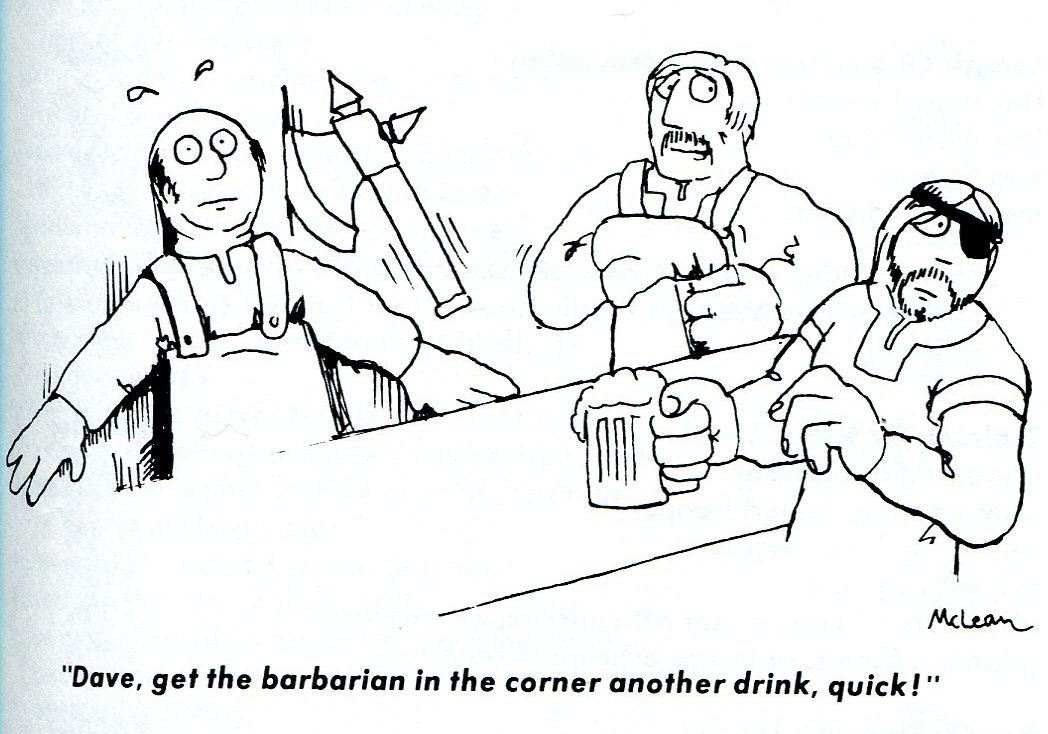
It seems I’m not the only one contemplating the mechanization of social skills these days. Reader BubbaDave pointed me at Justin Alexander’s post from just a couple days ago titled Rulings in Practice: Social Skills. It’s a pretty insightful post and I feel like I have a lot to react to, so please go give it a read and then come on back here, as I don’t want to waste my words summarizing his entire post.
First off, I think Justin really hits the nail on the head in his top three bullet points on the problems created by social skills. I especially like how he relates it to the player’s preference level in immersion. Players who put a lot of value into their ability to embody their character, he says, will feel like social skills bypass their ability to do so. While I agree with this, I also think it’s important to acknowledge that not every player wants that level of immersion, and perhaps some appreciate a mechanized way to represent that their character is skilled in an area they as a player are not. Ultimately there’s a very real chance that any given table may include players on both ends of this spectrum, and they will all look to their DM to find a balance that works for everyone.
I do like the simplicity of his method “state the intent, make the check, narrate the result.” It actually feels pretty similar to what you see a lot of DMs, myself included, do to give combat a more cinematic feel. Rather than just “roll to hit, you miss, next”, I try to narrate the outcome of each roll. When a player misses the target AC by one point, I might say “you rush in with your sword held high, and just as you swing it down towards his head he raises his shield to intercept the blow, creating a shower of sparks as the metal rim turns aside your blade.” I don’t always remember and am not always that eloquent, but I do my best.
That said, Justin then progresses from overtly stated intent to implied intent. He says “the out of character declaration of intent isn’t essential”, which I feel like I have to completely disagree with. Sure, maybe sometimes DM and player are on the same wavelength and assumptions can be made, but I feel like the chance for misinterpretation here is very high. It’s even worse when the NPC simply doesn’t have the information the player thinks he should have, and thus the difference between trying to deflect vs. an honest “I don’t know” is lost on the player.
Justin really lost me in his example involving the falafel dealer. He says “The GM doesn’t have to try to bundle the entire resolution into a single line of NPC dialogue (and maybe a short summary). Instead, the GM and player can both key off the mechanical outcome and roleplay out the rest of the scene consistent with that result.” But from the example I have no idea where the mechanical roll happened, or what the result was. Am I to assume that all that was gilding on the outcome of a roll at the very beginning? If so, how did the player know to keep pressing the DM until the NPC cracked?
I also think this approach can come in conflict with the “rulings not rules” tenet of old school play. In Matt Finch’s example of “rulings not rules”, he talks about the DM coming up with modifiers and stake-setting based on the player’s approach. For example, jumping down on an opponent from high above gives the player a +2 to hit, but a miss means he lands flat on the ground. I love this kind of stuff, but it requires that we know all the variables up front. If the player is only going to bring certain social pressures to bear after the roll is made, how can we adjust the odds or the stakes based on inventive player behavior? Going back to the falafel dealer example (man I love calling it that), should the player not have gotten some bonus to his roll for dangling the NPC over the ledge of a tall building? But I think Justin’s intent there was that the action was a description of success rather than an influencer of success.
The use of multi-step resolution I find even more troubling. It implies that as DM I should be able to know in advance how many steps are required for any given action. For example, at the very beginning of the shake-down I would have to decide that it’s going to take say 3 out of 5 attempts to get the truth out of this NPC. I feel like I would find it very hard to make this choice up front, and would prefer to adapt to how inventive the players get. Sometimes the players just want to say “tell me what you’re up to or I’ll bash your face in”, while other times they may have more to bring to bear after an initial failure — “Still not talking eh? I know you’ve been skimming from the top” or “Each time you lie I take a digit.” In practice I feel like I usually don’t know what the players might come up with, so I’m perhaps ill prepared to tell them “you’re going to need to make 3 of 5 Intimidation checks” before we even start narrating the back and forth.
I think Justin makes a very good point about it being weird that we’re OK with forcing characters to act against their best interest through magic but not through social interaction. However I’ve found the former an easier pill to swallow by simply making the magical effect all the more obvious. Watching your allies act against their best interest while glassy eyed and muttering “yes master” just feels better than an earnest “well, he made some very compelling points.”
One final point I’ll make is that while Justin outlines a lot of use of active social skills (persuasion and intimidate), he never touches on reactive social skills (insight). For a solid example, the latter might come up when I as DM am simply speaking as an NPC and a player decides they find what I said suspicious. Now, they may be right or they may be wrong, but either way they’re going to pop out with “can I make an Insight check on that?” In this case it’s not possibly to follow the model of “state intent, make the check, narrate the result.” The player cannot even formulate intent prior to the narration. Possibly I should try to invert my interpretation here – perhaps the intent belongs to the NPC – but surely I’m tipping my hand as DM if I ask a player to roll Insight prior to even beginning the dialogue.
So where does all this leave me? I’m not sure, I think Justin makes some excellent points, but I also am not convinced that his method is going to work. I think the best I can do is set expectations ahead of time, and negotiate with players if they have problems. My default I think is going to remain that I prefer to not use social skills at all, and would rather fall back on good old acting.
As I write that I do find at least that I want to use the word “acting” instead of “roleplay”, because I don’t want to imply that doing it a different way is not roleplaying. The old “roleplay not roll-play” feels a bit patronizing. Acting out parts may be the style of roleplay I personally prefer, but above all I think it’s always imperative to adapt the way you play the game to the needs and desires of the specific group you’re playing with.



“But from the example I have no idea where the mechanical roll happened, or what the result was.”
It happens here: “Make an Intimidate check. (it succeeds)”
“For a solid example, the latter might come up when I as DM am simply speaking as an NPC and a player decides they find what I said suspicious. ”
Check the “Social Skills as Information” section.
Note that the Rulings in Practice series is spun off from The Art of Rulings, which deals with active vs. reactive skill checks at length.
Yikes, how did I miss the roll there? Sorry about that, my eye must have glazed over it. Though I think my question stands on how did the player know how much to keep pressing? Especially in the case where the NPC literally doesn’t know the information he’s looking for, this can be possibly difficult to navigate.
I will definitely take a peek at the earlier post to see what I missed, thanks for the link!
Really thought provoking stuff by the way. Thanks so much for sharing your thoughts. I’m sure I’ll be rolling this one around in my brain for quite a while to come.
I totally agree with you here, and was made queasy at exactly the same point in the falafel dealer interaction (and, likewise, had to backtrack to find the surprising place where the check was made). After the check is successful and the DM’s next line is, ““I never knew. I don’t know. I swear to God—”, this seems ripe for misunderstanding, e.g., I can imagine a lot of players getting pissed and saying/thinking “If my good checks don’t do anything this is bullshit”, or something like that, instead of expanding the improvisation.
It’s just one example, but I’d certainly be comfortable with my D&D intuition of acting out the give-and-take of a scene, and then using that at the climax to determine modifiers to a reaction roll to see if the NPC submits or not. (Echoing my intro computer-class dogma on error messages: must be “clear, specific, immediate, tell the user how to fix the problem”).
Also I don’t know if this ties into a larger practice on whether you keep “information” rolls hidden from players or not. Some will default to having those Intuition/Search, etc. skills rolled by players in the open (like other skills), and then need to play-act being unaware of the result — whereas I think Paul & I both reserve those checks almost uniquely for behind-the-screen DM rolling. Maybe that’s a rare practice, I don’t know?
On the topic of the PC knowing to keep pressing during the falafel dealer example, I think that’s just Justin giving an example of the player adding their own embellishment to the GM’s narration (similar to a player jumping in with a snappy one-liner when the GM is describing the outcome of a good combat roll). Had they not interrupted, the GM could’ve continued as:
“I never knew. I don’t know. I swear to God I never knew! Never! They went to some guy for a couple of days before they went to the dealer. There was something…something else in the drugs. Something hidden!”
Same information, no spontaneous acting needed.
On the topic of whether the rolls and/or possible outcomes are open or hidden, Justin does have other posts on those:
https://thealexandrian.net/wordpress/39142/roleplaying-games/art-of-rulings-12-hidden-vs-open-difficulty-numbers
https://thealexandrian.net/wordpress/39367/roleplaying-games/art-of-rulings-13-hidden-vs-open-stakes
That all said, I’m not a fan of social skills in general. Part of me likes having some mechanical differentiation for how well a PC can perform at it, but I’m finding myself leaning towards just using a general CHA check or reaction roll with a situational modifier based on how that specific NPC would respond to bribes/threats/cajoling/flattery/blackmail/etc.